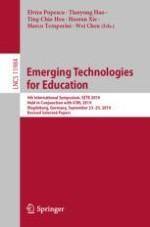2020 | OriginalPaper | Chapter
EFL Writing Assessment: Peer Assessment vs. Automated Essay Scoring
Authors : Meixiu Lu, Qing Deng, Manzhen Yang
Published in: Emerging Technologies for Education
Publisher: Springer International Publishing
Activate our intelligent search to find suitable subject content or patents.
Select sections of text to find matching patents with Artificial Intelligence. powered by
Select sections of text to find additional relevant content using AI-assisted search. powered by
